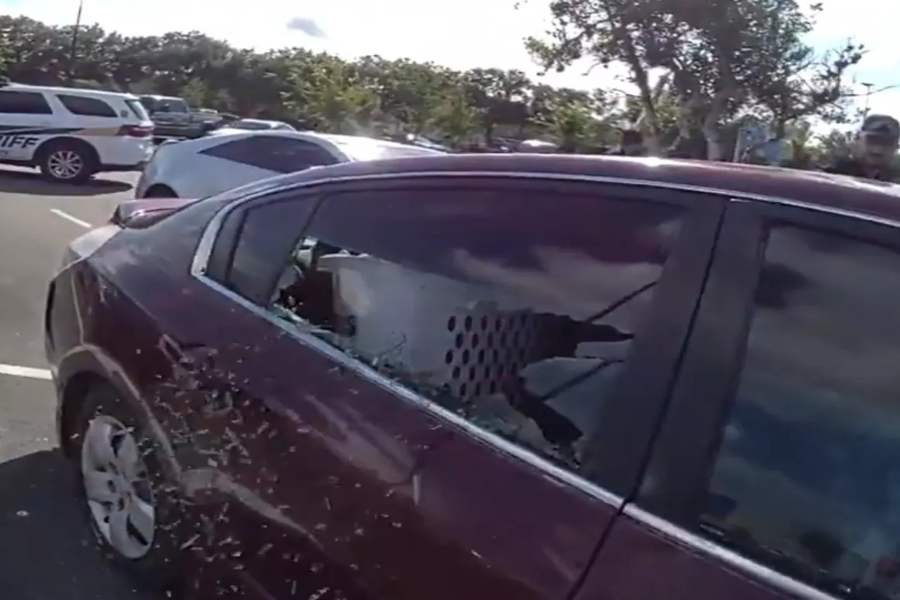
In a dramatic rescue that unfolded under the intense Florida sun, bodycam footage captured the decisive moment when a Florida deputy was forced to take immediate action to save a young child’s life.
The incident occurred on a scorching afternoon in the bustling parking lot of a Walmart in Palm Coast, Florida, where a one-year-old girl found herself trapped in a sweltering vehicle. With the interior car temperatures rapidly escalating and reaching dangerous levels, the situation’s urgency was palpable.
The deputy, confronted with the critical choice between waiting for further assistance and breaking the car window, opted to prevent a potential tragedy. This swift decision highlighted the problem of leaving children unattended in vehicles, particularly in hot weather. The forceful shattering of the glass was a stark reminder of the immediate dangers posed by the heat, emphasizing the risk of heatstroke and other heat-related injuries in such enclosed spaces.
As the glass shards gave way, the deputy’s actions not only saved the toddler from a possibly fatal heat exposure but also served as a grave reminder to all parents and guardians about the lethal consequences of leaving vulnerable young ones in parked cars. This incident casts a spotlight on the ongoing need for public awareness and education regarding vehicle safety in high temperatures, underscoring the potential for dire outcomes in what might seem like mundane circumstances.
The Tense Rescue
The drama escalated rapidly when the Flagler County Sheriff’s Office received a distress call around 5 p.m. on May 20. A frantic parent, trembling with urgency, reported that their toddler was inadvertently locked inside their Nissan Altima, with the car keys trapped inside as well.
As the Florida sun bore down, the temperature inside the car soared, turning it into a potentially fatal oven. The released bodycam footage captures the gravity of the situation, showing Deputy Christian Harrison arriving at the scene to find the child’s parents pacing anxiously outside the car.
The air was thick with tension as the mother, near hysteria, pleaded with Deputy Harrison not to break the window, fearing for her child’s safety amidst the shards of glass. However, recognizing the critical nature of the situation, Deputy Harrison knew he had to act swiftly.
Equipped with agency-issued shatter balls, he chose to target the passenger’s back window—strategically the safest distance from the toddler. The bodycam recorded every heart-stopping moment as he methodically cleared the broken glass with his collapsible baton, ensuring no additional harm would come to the child.
He reached inside to retrieve the visibly distressed toddler, who, although scared and sweaty, appeared physically unharmed. This decisive action underscored the importance of rapid intervention in such life-threatening scenarios.
Medical Assessment And Aftermath
Upon the child’s extraction from the heated confines of the vehicle, the first responders immediately took over, their professional calm a stark contrast to the earlier chaos. Paramedics, trained for such critical situations, quickly assessed the toddler’s vital signs, ensuring she was responsive and checking for any signs of heatstroke, which can escalate fatally within minutes.
The young child, flushed and visibly sweating from the ordeal, was provided with hydration and kept under observation to monitor for delayed symptoms, which are a concern in such high-stress and high-temperature exposures.
Deputy Harrison, watching the medical team’s quick actions, reflected on the incident. “In situations like these, seconds count. The temperature inside a parked car can skyrocket, especially under the Florida sun, making it a deadly trap for anyone, particularly small children,” he noted. The quick medical assessment confirmed that while the child was indeed in distress when found, prompt intervention prevented any long-term harm.
This incident serves as a potent reminder of the risks associated with leaving children unattended in vehicles, especially in warm climates. Following the assessment, the relieved parents were counseled on safety precautions to prevent such dangerous situations in the future.
Official Statements and Warnings
Sheriff Rick Staly praised the deputy’s quick actions and reiterated a stern warning about the dangers of leaving any living being in a parked vehicle, especially children. “Heatstroke can occur in minutes, even if it doesn’t feel exceedingly hot outside,” Sheriff Staly noted, stressing the preventability of such difficult situations.
The incident also led to a citation for the vehicle’s driver, who was charged with attaching an unassigned tag/registration decal. However, this was unrelated to the child being locked in the car. Flagler County officials have not pressed any additional charges related to the incident, but the Florida Department of Children and Families was notified as a precaution.
Preventive Measures and Technology
This harrowing incident underscores a critical public health issue: the lethal risk of pediatric vehicular heatstroke during the warmer months. Each year, an alarming average of 37 children under the age of 14 succumb to heat-related fatalities inside vehicles, a statistic reported by NoHeatStroke.org.
The vast majority of these tragedies stem from children being accidentally left or becoming trapped in cars. Public education campaigns emphasize that such heartbreaking outcomes are avoidable with heightened awareness and proactive behavior.
Advancements in automotive technology are playing a crucial role in combating this issue. Many car manufacturers have started integrating innovative safety features such as rear-seat reminders.
These systems alert drivers to check the back seats of their vehicles before locking and leaving, addressing the common oversight that can lead to fatal heat exposure. Some models go further, implementing sensors that detect movement in the car after the engine has been turned off, triggering alarms to alert passersby and authorities if necessary.
Despite these technological aids, community vigilance remains paramount. Parents and caregivers need to adopt a routine of double-checking their vehicles before walking away.
Additionally, bystanders are encouraged to keep an eye on parked cars and immediately report any instance of children left unattended. Through a combination of community involvement, technological aids, and educational efforts, the aim is to eradicate these preventable deaths and protect our youngest and most vulnerable from the dangers of vehicular heatstroke.








